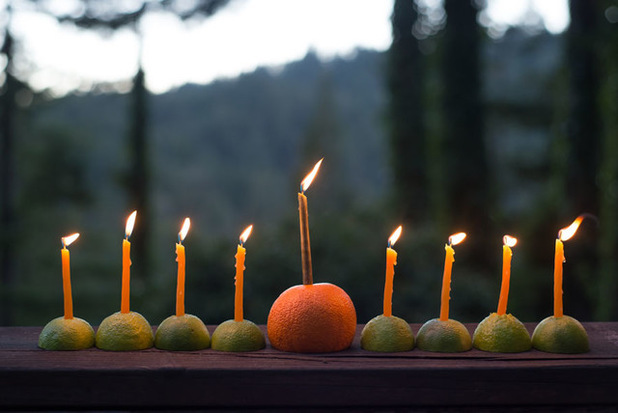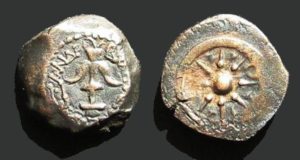
by Geoff Vasil
There’s a bit of mystery as to what Hanukkah is among non-Jews. I grew up in America and went to an “alternative” grade school in the 1970s, where they attempted to teach us about different cultures. One winter, when I was in the first grade, some nice ladies came and told us the Hanukkah story. I think even then they stressed it was NOT the Jewish Christmas, and they told us the traditional gift for children was a simple orange, which were scarce in Northern Europe and reminded Jews of their true homeland.
That’s the good news about Hanukkah, if you’re worried about what gifts to buy. Hanukkah isn’t a big gift-giving holiday. Children may expect an orange or Hanukkah gelt, foil-wrapped chocolate coins. It’s traditional for children to spin the dreidl on Hanukkah, and foods fried in oil—doughnuts and potato pancakes or latkes—are traditional, for reasons to be explained below.
Of course in Western society, in majority-Christian cultures, Hanukkah must compete in the mind of the child with that grand finale of all holidays, Christmas. Christmas is so pervasive it has been adopted even by the non-Christian Japanese. In the Soviet Union they could never quite get rid of it, despite determined efforts to create a universal Winter Holiday with all sorts of fairytale and cartoon characters (including Disney characters towards the end-times for the USSR). Romanian dictator Nicolae Ceaușescu only really met his fate after he outlawed Christmas. Santa Claus seems to have some very powerful friends, and as the saying goes, you can’t fight city hall, in this case, you can’t fight the pull of the North Pole and Santa’s workshop. Of course Jews aren’t fighting, or joining, just maintaining what is called the minor holiday of Hanukkah in parallel with the Christian festival.
A number of scholars and mythologists point out Hanukkah’s almost certainly pagan origins as a winter solstice celebration. The idea of maintaining the light against the darkness, which we’ll get into below, is at the heart of all winter solstice celebrations, and of course there were pagans in the land of Canaan before there were monotheists. Likewise, the Christmas holiday is largely a pagan celebration which began in Rome when Christ’s birth was tacked on as an afterthought, and which accrued cultural elements as Christianity spread through Europe. Again, the story of birth, death and rebirth is at the heart of pagan winter solstice celebrations. And of course Christians can’t really agree when Jesus was born, just ask an Ethiopian Christian.
Why is Hanukkah called a minor Jewish holiday? Minor is defined in opposition to the High Holidays, Rosh Hashanah and Yom Kippur and sometimes the holidays surrounding these Days of Awe as well. Hanukkah dates to a later period than most of the basic Jewish holidays, to just before New Testament times, as Alexander the Great’s death led to his sons fighting over their inheritance in terms of conquered lands. While Alexander is said to have had a special place in his heart for the Land of the Jews and largely left them unmolested, his son Ptolemais seems to have had less sentimental leanings as he took control of Egypt, Judah and Israel (the famous Cleopatra was the last Ptolemaid “Greek” monarch of Egypt, although by that time the family had probably become more Egyptian than Greek in their speech and thinking).
The Maccabees are the brothers who rose up in revolt to Greek rule and created the independent Jewish Hasmonean kingdom from ca. 164 BC to 63 BC. The story of Hanukkah is from this period. Very briefly, the Temple in Jerusalem was retaken, but there wasn’t enough olive (or other) oil to keep the lamps there lit. There was enough for one day, but it lasted for eight. This miracle is celebrated with the lighting of one candle on each day of Hanukkah. Foods cooked in oil are consumed in memory of the oil which miraculously was sufficient to keep the light alive. Hanukkah gelt, the coins given children, likely recall the Hasmonean coinage minted most profusely under the “last King of Judea,” Jonathan, aka Alexander Jannaeus, coinage being an attribute of statehood. The idea of “special money” also goes back to special coinage minted for use in the outer Temple to purchase offerings, etc, the coins of the occupying power being considered ritually unclean. This idea of profane coinage was current at the time of the New Testament, where Jesus says to “render unto Caesar that which is Caesar’s,” i.e., coins with Caesar’s image, and unto God that which is God’s. The dreydl, dreidel or dreidl was accrued to the holiday much later, in Central or Eastern Europe, with a backstory created over time originating it in Torah study by Jews hiding in caves from the Hellenic (Greek) rulers of the land at the time.

The Maccabean revolt set the stage for everything that happened in the New Testament, as nominally Greek rule shifted to Roman, with all the assorted factions and sects arising in lesser or greater opposition, including the followers of John the Baptist, the Zealots, zikari assassins, the Essenes, theraputae, Zaddokites, the Qumran community with what are now known as the Dead Sea Scrolls, the early Christian movements and the Bar Kokhba and other revolts. The First and Second Books of Maccabees are included in the Old Testament canon by the Catholic and Russian Orthodox Churches but not by the Protestants or the Anglicans (and Episcopalians), who consider it apocryphal. In modern Judaism the books aren’t seen as anything more than historical and of great interest. There is also a Third Book of Maccabees which is canonical in Eastern Orthodoxy but not the Catholic Church, and which predates the first two books, telling the story of the persecution of Jews by the Greeks before the uprising. One controversial American Episcopalian archbishop wrote an entire book in the 1960s about how early Christianity was just another in a long series of Maccabee-like insurrections, which was later coopted by Roman authorities and set up as the religion of the empire in order to thwart opposition in the occupied territories. In any event, the Maccabean Revolt and the Hasmonean kingdom(s) were a little too recent—just over 2,000 years, the blinking of an eye—to qualify as an intrinsic, core holiday in Judaism, falling on the cusp of the destruction of the Second (some might say Third, Samaritans might say fake) Temple in Jerusalem.
I’m still intrigued by that orange the nice ladies showed us in first grade. Throughout my childhood I received small citrus fruit in my Christmas stocking, tangerines I suppose (and my favorite item was chocolate coins wrapped in foil. Somehow Hanukkah gelt spilled over into Christmas stockings where we lived at least). Tangerines, of course, come from Tangiers, after which they’re named with the adjective describing Tangiers, not from Judah, Judea, Israel or Palestine. Does it connect with the strange citrus fruit known as the etrog which is an essential item at Passover? The entire citrus family is a huge mess botanically There are at least two different, contradictory systems of classification, neither of which have withstood scrutiny by modern genetics. No one can really tell anymore the difference cultivated varieties and hybrids, although there are certainly wild species, many of which haven’t been tamed for use in kitchens or soft drinks yet. In effect in the citrus family the lines blur between natural and artificial selection, probably because humans have been eating citrus longer than we have been modern humans, whatever modern human means exactly at this point. In essence, the citrus story is too old to be told. What is certain is that we all came from someplace warmer, where citrus grows freely most likely, and the travails of the Jews from the Holy Land follows paths laid out much earlier as humans spread north into colder climes. It’s nice to take stock, as the North Pole tilts to its furthest point away from the Sun, of where we come from, whether we call it Eden, Arcadia, the Promised Land or something else, and to remember we’re all on this trek together, this crazy journey of life from the tropics to the extreme poles, revivifying the earth after the last ice age or whatever happened to remove the crocodiles from London and the hippopotami from Siberia. Somehow the light didn’t go out, and life wins yet again. On the miniature level every winter, as the day shortens. On the macro-level over the millennia, as conquerors come and go, but the people remain with memory intact of earlier and likely better times, which will come again, in time.

